Re-learning the true worth of an ancient Chinese invention.
“Absolutely zero value” is a sentence I came across three times recently. In two very different circumstances. It isn’t the actual utterances that were significant, it was the relationship between the two times and places in which the sentences were used. The first two times the sentence was used were about design. And that was in Asia. The third time was about paper money and that time it was in Europe about 400 years ago. Its ok I don’t have a time machine, I was reading a Kindle book – although I suppose that’s a kind of time machine too isn’t it?.
Although it is difficult to understand, it was a Financial Vice President in Linkou, south of Taipei who first said to me that design has zero value. I can quote him accurately because his words came rather as a shock. I won’t reveal which company it was except to say that they are rather clever at OEM consumer electronics and their buildings dominate most of Linkou. In an age where all the most successful companies who score above average in growth and profitably - irrespective of their location in the world – all use design strategically as one of their most potent value earners, it is curious to find this attitude from a financial official, of all people. The second “design has zero value” was in Shenzen where a CEO dismissed design totally offhand because he explained, “any design can be copied in 14 days in China.”
Before I answer that one, let me tell you about the Kindle book. As everyone who reads this article knows from school, paper money was invented in China. From the first “jiao zhi” notes of credit, there was regular use of paper money by the Song dynasty and it was widely used in the Yuan dynasty. It took Europe just a bit less that 1000 years to catch up on the innovation from the Orient. Flanders, now part of the Netherlands, was where it got off to a start as the Dutch merchants were then the most adventurous of the Europeans in their early globalization and foreign trade. A bank in Sweden was the next big European mover and that was in 1660. In what was to become USA, paper money had to wait until the 1700’s and the federal government of the United States did not print banknotes until as late as 1862. It is astounding to see these dates today.
What the Europeans had difficulty in understanding was that a very small piece of paper could carry so much value. Today we have to think carefully about that, because bank notes and plastic credit cards are so common. But in Europe 400 years ago people were used to having real gold and silver coins in their pouches. In fact the name of the British pound and the symbol for that currency is still related to a pound weight of sterling silver. A pound weight is about 450 g. The symbol is £ - libre – which is latin for a pound. But a simple piece of paper has zero value. How could it possibly be worth so much? And even if it is worth something, a piece of paper can be copied so easily. Doesn’t that begin to sound familiar?
What everyone knows today is that a bank note has great value because somewhere in the cellars of the imperial palace or the national bank, there is a store of real gold and silver that represents the true value of the currency. When you make a copy of a bank note it goes back to being worthless. Just a piece of paper. So too with design. Design is not just external styling. Design is the same carrier of value as a bank note because it carries the knowledge and the company values of the creator. It isn’t as abstract as it sounds. To design well you need to know who you are designing for, what the user actually needs. You need to put that together with the best appropriate technology and manufactured in an optimal way and then transported to a place within the buyer’s reach. As well as being functional, good design will give status, express lifestyle and a multitude of other immaterial – but substantial - values. In this day and age, product design is THE brand platform and it carries with it the history of the company who makes it, the company ethos and its origins. Look at a Jaguar car and you see the racings cars that won the Le Mans races in France in the 60’s. Buy a bottle of Chanel 5 perfume and you are also purchasing the genius of the French woman Coco Chanel who gave sartorial freedom to the women of the world through her fashions and in the early 1900’s
European companies know this to the extent that design and product branding on a global scale is dominated by European concepts. Having struggled to understand that weird invention of the Chinese – bank notes made of paper – the Europeans took to design as a natural extension of the concept of carriers of value. When South Korean giants like Sansung and LG started to move big time into the global scene, it was European design that put them there. Apple leapt to prominence when London designer Jonathan Ives joined the team. In Taiwan, HTC is quickly becoming a major global player – after they started using good design professionally and strategically. Design has no limits.
Here is a good exercise after you have read this article. Wander around the household departments of Mitsukoshi or the other big department stores in Taiwan and you will find that even kitchen utensils from Europe are thoroughly designed and branded. Check out Bodum or Eva Solo brands or Stelton and imagine the people who design and make these quite normal objects – cups, dishes, teapots. What are they trying to say to you? It’s a communication. It is active. Then try to guess how many dollars they put in the bank from each object. After that go to the local ironmonger and work out how many cheese cutters or salt and pepper pots the guy needs to sell to even get near the same income. Millions. And the difference is not magic. It is originality and good design from designers who are actually thinking about you as an individual as you wandered round the looking at the shelves. Believe me, because I know the designers personally. They are nice guys. And can your company do the something similar? To quote Barak Obama – Yes you can!!!
It seems to be a strange paradox that the Chinese, the actual inventors of the bank note, now finds it difficult to grasp the deeper understanding of the power of design. The best proof of the link between bank notes and good design is to look at the value of counterfeit notes – and copies. Counterfeit notes can fool people but their falsity is often quickly revealed and the notes become valueless – not worth the paper they are printed on. Literally. And the perpetrators are unceremoniously thrown into prison. False products often suffer the same fate. A falsified copy is seen as a criminal act, the goods confiscated and the villain bound for jail. For “inspired” copies and me-too products the sentences are not so severe except that the value of the product is nowhere near the value of the original. Me-too copies of an iPhone, usually at a visually lower quality, are almost treated like junk. Hardly worth the cost of putting the materials together. So why even bother to manufacture them when a modicom of original thinking can increase that value. Which brings me full circle. Even as an author I have in mind who you are, the reader. You are reading this at home, on the MRT or in the office. You are a probably a manager, an ambitious young person, a business student as well as being an experienced CEO. Certainly someone interested in management, otherwise you wouldn’t have parted with your money to buy this magazine. On the other hand you are sitting in the bank waiting your place in the queue. Still you must have some kind of interest in commerce or you would have chosen the attractive women’s magazine or that one over there about motorbikes. You have something to do with business. And I do believe that your career and your business will be more inspired and successful by considering that the values added by good design are similar and have a similar effect to the value of the banknotes in your wallet or purse. From that simple comprehension you can go far.
2010/12/21
2010/12/01
Wikileaks cables: George Osborne 'lightweight and inexperienced'
Shadow chancellor's high-pitched voice contributes to view that he lacks gravitas, senior Conservatives tell US officials
- Nicholas Watt, chief political correspondent
- guardian.co.uk,
- Article history
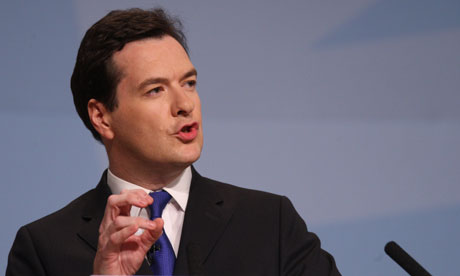
In a candid account, senior party figures told the embassy that the future chancellor had been stopped from making an emergency statement at the height of the financial crisis in 2008 in light of his weaknesses.
The striking criticisms of Osborne are disclosed in an account of the 2008 Tory party conference by Richard LeBaron, deputy head of mission at the US embassy.
A Cameron insider told US officials in a private meeting that it had been decided Cameron should deliver the speech "as private party polling indicated that the public feel Osborne lacks the necessary 'gravitas'. Somewhat unfairly, party officials thought, polling indicated that Osborne was seen as lightweight and inexperienced, in part due to his high-pitched vocal delivery."
The senior Tory said Gordon Brown's warning at the Labour conference that the financial crisis meant it was "no time for a novice" had struck home. "This party insider also revealed that Brown's charge that Cameron was a 'novice' at a time of crisis had gained significant traction with voters," the cable said. "Internal Tory spot polling had found, worryingly for the Conservatives, that contrary to the general consensus, if an election were held the next day, Gordon Brown would be re-elected, albeit with a vastly reduced Labour majority."
LeBaron said of Cameron's conference speech: "If Cameron's aim was to convince the public that he has serious policies and will bring changes, then he succeeded in the eyes of much of the press. Cameron may have faced criticism that his speech failed to lay out, in specifics, the party's plans for government but no doubt he is trying to avoid the fate of previous leaders who, having set out a detailed platform far in advance of any general election, later had their best ideas taken by the Labour government."
SOURCE
WikiLeaks cables: Mervyn King had doubts over Cameron and Osborne
Diplomatic memos reveal Bank governor thought top Conservatives lacked experience to deal with deficit
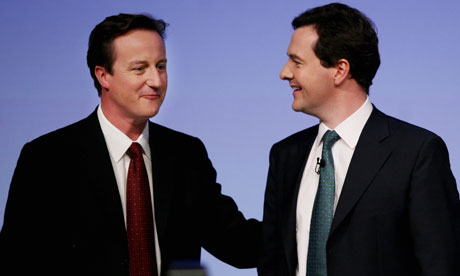
Mervyn King told the US ambassador, Louis Susman, he had held private meetings with the two Conservative politicians before the election to urge them to draw up a detailed plan to reduce the deficit.
He said the pair operated too much within a narrow circle and "had a tendency to think about issues only in terms of politics, and how they might affect Tory electorability". He also predicted that economic recovery would be "a long drawn-out process", since Britain had not been through an economic restructuring.
His apparent pressure on the Tories, a few months before the election, gives further credence to the claim that King was central in persuading leading coalition figures to back a far more dramatic deficit-reduction programme than any politician advocated during the election campaign. He has recently been criticised by members of the Bank's monetary policy committee for straying into politics.
The cables released today also disclose:
• Internal Tory polling found Osborne lacked gravitas with the public, partly due to his "high-pitched vocal delivery". As a result, Cameron, not Osborne, made the special address on the economic crisis to the party conference in the autumn of 2008.
• The defence secretary, Liam Fox, told the Americans that the Tories would be tougher on Pakistan because they were less reliant on votes from the Pakistani community than Labour.
• King believes Europe's sovereign debt crisis will accelerate political union. "Leaders in Germany and France have recognised that allowing monetary union to happen without corresponding political cohesion was a mistake and one that needed to be rectified," King told American diplomats.
• The Liberal Democrats' two top strategists, Polly Mackenzie and Chris Saunders, now both working in government, planned to run a fierce anti-Cameron election campaign, describing him as "out of touch with real life". The death of Cameron's son Ivan forced them to drop the plan since it "eliminated these vulnerabilities".
• Referring to Muslim extremists in Britain from Pakistan, Cameron told the Americans at a meeting in April 2009 that under Labour "we let in a lot of crazies and did not wake up early enough".
There is a broad expectation that the governor of the Bank of England will behave with political neutrality, and will not seek to interfere directly in macro-economic policy, the preserve of the Treasury and politicians. Yet the cables reveal he pressed Cameron for details of his deficit plan.
"King expressed great concern about Conservative leaders' lack of experience," Susman wrote in his classified dispatch to the US secretary of state, Hillary Clinton, after his 16 February meeting with the governor. "[He] opined that party leader David Cameron and shadow chancellor George Osborne have not fully grasped the pressures they will face from different groups when attempting to cut spending.
"In recent meetings with [Cameron and Osborne], he has pressed for details about how they plan to tackle the debt but received only generalities in return. Both Cameron and Osborne have a tendency to think about issues only in terms of politics and how they might affect Tory electorability.
"King also expressed concern about the Tory party's lack of depth. Cameron and Osborne have only a few advisers and seemed resistant to reaching out beyond their small inner circle."
In a section headed "Conservatives: not prepared", the ambassador said King had stated that "hundreds of government officials will make pleas of why their budgets should not be reduced".
A Bank spokeswoman responded tonight: "The governor has a very effective working relationship with the prime minister and the chancellor."
King's defenders would argue he was not seeking to press the Conservatives to follow a specific deficit path, but given the state of the markets it would be legitimate for him to ask them to put detailed plans in place. Arguably this scepticism over the ability of Osborne and Cameron to press ahead with a strong deficit reduction plan has proved unfounded since they have announced a programme far more ambitious than expected.
King told Susman he had fears the "Cameron/Osborne partnership was not unlike the Tony Blair/Gordon Brown team of New Labour's early years, when both worked well together when part of the opposition party, but fissures developed – for many reasons – once Labour was in power. Similar tensions could arise if Cameron and Osborne disagreed on how to handle the deficit, and the lack of depth in their inner circle would aggravate the situation."
The governor was gloomy about economic prospects, Susman reported. "It was hard to be optimistic about recovery in 2010," King argued, and noted "a double-dip recession was still a possibility".
It is known that King, in the wake of the coalition's formation, played a role in persuading the Liberal Democrat leader, Nick Clegg, that major steps were needed to prevent bond traders pulling the plug on the British economy after the collapse of confidence in other debt-ridden countries, such as Greece.
Accounts of the coalition negotiations have also revealed that Osborne, in his talks with the Lib Dems, said he had the support of King for his deficit programme. But it is the first time it has been revealed King pressed for a detailed plan.
The cables also reveal King was not the only source of disobliging remarks about the Tory leadership, according to Susman.
The rightwing Conservative MP for Sevenoaks and now Conservative deputy chairman, Michael Fallon, also confided his doubts to US diplomats.
His remarks were detailed in a cable sent in October 2008 titled: "Conservative party caught flat-footed by Brown's quick manoeuvres on financial crisis, says senior Tory MP".
It stated: "The Tories' response to the crisis has been regrettably tepid … The Conservative party felt the absence of a strong shadow chancellor and the party's counter-proposals to Labour's plans have been 'all over the place'. Fallon particularly criticised Osborne's op-ed piece in the October 28 Daily Telegraph as a 'weak', almost laughable, response to the economic crisis."
Mark Tokola, the embassy's economic minister at the time, concluded: "Fallon's comments to us reflected Conservative frustration – and some grudging admiration – for prime minister Brown's skill in seizing the high ground during the economic crisis.
SOURCE
Student protesters ignore winter freeze with mass rallies against tuition fees
• Marches in cities across UK pass off mostly peacefully
• Metropolitan police reports 153 arrests in London
• Metropolitan police reports 153 arrests in London
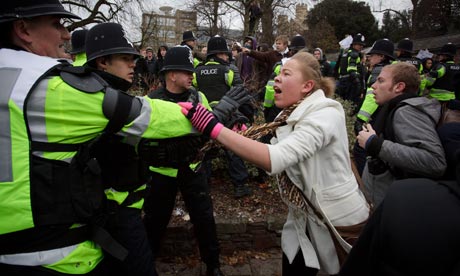
Large demonstrations took place in Brighton, Birmingham, Bristol, Manchester, Newcastle, Oxford and London. The Metropolitan police said 153 arrests had been made in the capital, 146 of which occurred after a group refused to leave Trafalgar Square at the end of the demonstration in London. Windows were smashed and missiles thrown at police, who charged at protesters with batons.
Students climbed on rooftops, stormed council buildings and stopped traffic in dozens of town centres, many saying they hoped the display of feeling would reverberate in Westminster.
Earlier there had been chaotic scenes in the capital when 4,000 students marching toward parliament tried to evade what they believed were attempts by police to "kettle" them in the bleak weather.
The demonstrators responded by dispersing across the city in separate marches, leading police in cat-and-mouse chases. One "feeder" march headed into the City, while others meandered past bemused onlookers at Oxford Circus and Hyde Park Corner, and near Buckingham Palace, stopping traffic en route.
"This is one of the most bizarre demonstrations I have been on," said Michael Chessum, 21, as he jogged up Regent Street with a group of riot police in tow. "It has been a shambolic policing operation because we agreed with them beforehand that we would march along Whitehall – but the spirit and determination of the students to get their point across has been pretty impressive."
The Met denied it had intended to kettle protesters, despite evidence of metal barriers and rows of officers waiting along Whitehall. It blamed the confusion on protesters, who, the force said, had begun their march earlier than agreed. "We made sure we had a flexible plan and sufficient resources to enable people to come back to Trafalgar Square where the protest was due to be held," said Chief Inspector Jane Connors. "That is what we did, moving around London, encouraging people to come back and meet together. We wanted to minimise disruption."
The mood was more harmonious elsewhere, although in Brighton about 600 protesters marched through the city before trying to force their way into Hove town hall. About 100 people managed to scale the roof of a car park and threw missiles, said police, but there were no arrests. Students also scaled a roof in Liverpool, where there were two arrests.
In Newcastle, students occupying a university building marched through the city centre in a peaceful event. Northumbria police said in a statement they had "nothing but praise" for the campaigners. "There were no arrests and no reports of any trouble of any kind," the force said.
Ten people were arrested in Bristol when about 1,000 protesters from both universities lit flares and pelted police with mustard. The M32 was closed when it seemed that the march might go towards the motorway.
In Birmingham, about 40 protesters broke into a council hall building, prompting a standoff with security and police. There were similar scenes in Leeds, where about 40 students occupied a university building, and in Oxford, where students invaded the county council offices.
Video footage showed protesters entering the Oxford building and walking through corridors before being ejected by police. The Conservative leader of the local authority, Keith Mitchell, said on Twitter: "County Hall invaded by an ugly, badly dressed student rabble. God help us if this is our future."
Greater Manchester police said there were five arrests in the city, but that only a "loose cordon" of officers was placed around hundreds of demonstrators who had gathered in the city centre.
About 400 students also walked peacefully through Cambridge, and, in Edinburgh, 300 protesters marched along the Royal Mile in the city and gathered at a rally outside the Scottish parliament. There was also an impromptu sit-in at Queens University, Belfast, and at the Trent building on Nottingham University's campus.
The scale and reach of this month's student protests have shocked the authorities, who fear that mobilisation against cuts could spread. Riot police were called to Lewisham town hall on Monday night when 100 protesters in the London borough tried to force their way into a meeting where councillors were voting to cut the budget by £60m. Police said arrests were made and several officers received minor injuries. The same protest groups are expected to focus on a council meeting in Camden, north London, tomorrow.
Many of the protests were organised by students occupying up to 32 university buildings across Britain. They have largely been independent of the National Union of Students. Threatened with a no-confidence vote, the NUS president, Aaron Porter, recently apologised for the union's "spineless" caution toward student activism and promised more support.
SOURCE
Student demonstrations: A game of protest Monopoly
This protest feels like kiss chase – or, when I see a policeman punch a boy, entirely without provocation, punch chase
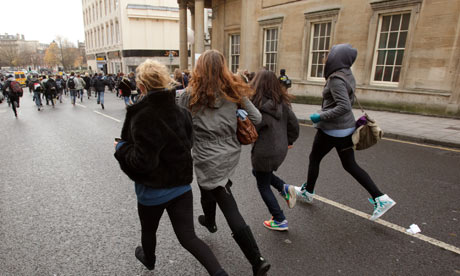
Whenever we see a block of police in neon jackets we run, or are chased away, sometimes down boulevards that are closed and empty, and sometimes through traffic-choked alleys. Tourists take photos. The odd white van toots at this mass of running students. An old man shouts: "Go back to bed!"
I do not know who is leading us, but we don't stop running. The march is fracturing – people are going up different streets and getting lost. Texts come through from the front, giving information. There may be a demonstration at Topshop, or maybe at Liberal Democrat HQ on Cowley Street. But no – we just run down Piccadilly Circus and into Regent Street, then Oxford Street. "I don't feel like a protester," says a music student. "I feel like a tourist."The students dance across Aldwych, singing It Must Be Love, by Madness, before breaking again into a run down to the Embankment. It feels like kiss chase – or, when I see a policeman punch a boy out of the way, entirely without provocation, punch chase. "I'm going," says one girl. "I have a seminar."
Soon, we are back in Trafalgar Square. We have played protest Monopoly for two hours and now we have stopped. The banners – Don't Put the Kettle On, Mr Cameron and I Can't Believe It's Not Thatcher – are lowered, and the leaders climb on the plinth below Nelson's column and speak, asking the students to come back next week. If we have been running from – or to – a fight all day, we get it now. A group of boys charge a police line and fall over. A smoke bomb is thrown, then a can of beer. The police move forward to kettle the students. And above us, on the steps of the National Gallery, tourists look confused at this vision of Britain 2010, angry and fighting in the snow.
SOURCE
Vince Cable considers tuition fees abstention for sake of Lib Dem unity
Business secretary says he believes fees increase is the correct policy but could abstain as part of collective vote
- Allegra Stratton, political correspondent
- guardian.co.uk,
- Article history
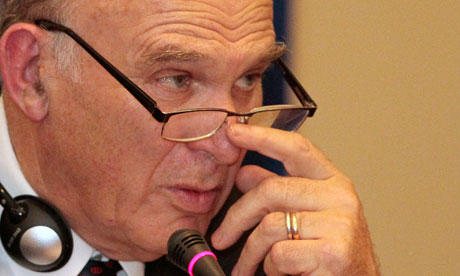
The party's former deputy leader, now business secretary in the coalition government with the Conservatives, made the pledge as the Lib Dem high command struggles to find a common voice in the parliamentary vote on the fee rise, which is expected before the Christmas recess.
Cable's successor as deputy leader, Simon Hughes, has been pressing for the party to abstain. Nick Clegg, the deputy prime minister and party leader, today refused to say how he will vote.
Labour kept up the pressure on the Lib Dems today. The party used an opposition day debate to call on the government to publish more information on its proposals and to advertise Labour's view that the rise is being used to plug gaps left by cuts in government spending. Labour wants the white paper on higher education to be published before the house is asked to vote on it.
Cable said: "If we all abstain, then that is the position I am happy to go along with. There is an option that we all abstain together and we are considering that.
"My own personal instinct – partly because I am the secretary of state responsible for universities and partly because I think the policy is right – is very much to vote for it. But we have got to vote as a group, collectively, and we are discussing how we do that.
"My position is somewhat different, but I am willing to go along with my colleagues. We are a disciplined party: we work together. We are clearly going through a difficult period over this issue and we want to support each other."
Lib Dem MPs have been wrestling with a pre-election promise not to support an increase but now find themselves presiding over a near-trebling of fees. The coalition agreement allows them to abstain, but many feel they must be true to their promise and vote against it.
A petition signed by 104 former Lib Dem parliamentary candidates called on Cable, Clegg and their fellow MPs to abide by the pre-election pledge to avert "many more years back in the political wilderness".
Yesterday the Welsh assembly announced Welsh students would not have to pay the increase in fees regardless of where in the UK they go to university. Setting out its response to Cable's proposals, Welsh education minister Leighton Andrews said that universities could charge the £6,000 to £9,000 range being charged by English universities.
"The increase in fees for Welsh-domiciled students, whether they study in England or Wales or Scotland or Northern Ireland, will be paid by the Welsh Assembly government," said Andrews. "They will not have to find either £6,000 or £9,000 to study. The public purse will continue to subsidise them."
The Tories published research suggesting that students paying a graduate tax like that proposed by the Labour leader, Ed Miliband, would end up paying back more money than under the scheme proposed by the government. Analysis by new Tory MP Chris Skidmore suggests the poorest graduates could end up paying back £5,000 more during their working lives.
SOURCE
These student protests will grow with or without Aaron Porter's support
The NUS leader's belated support for the university occupations reveals someone uneasy with radical direct action
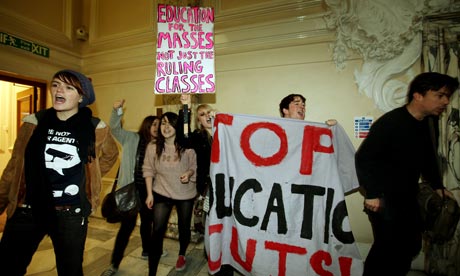
It was in such a meeting that we heard news of NUS president Aaron Porter's statement of support for the anti-cuts occupations that are ongoing in many of the country's universities and look likely to grow. A ripple of polite applause crept across our lecture theatre but in general the mood was indifferent. Compared with the times we've received emails from prominent political activists, promises of "dinner for all" from our lecturers or words of congratulations from local people, it didn't seem to matter that much.
It is our occupation's atmosphere of radical, creative discussion and collective action that might explain why Porter's apology for "dithering" in recent weeks fell a little flat. On the second National Day of Action today, and after six nights, our occupation is stronger than ever. Maintaining easy access in and out of the building has meant our space has been available for local sixth form and college students as well, providing a supportive environment for lecturers to have meetings about the cuts. We have organised our own daily educational programme, open to the public, as well as helping to allow scheduled classes to continue in our occupied space. Calls from local and national press are now almost as frequent as donations of food and blankets.
Another reason we were unmoved by Porter's statement was perhaps because his "U-turn" is a reflection of what we have experienced locally with our student representatives. They too have made new promises to support anti-cuts campaigns but we have learned through six days of successful occupation that this support, though welcome, is not vital. Like our sabbatical officers, Aaron Porter should support students engaged in peaceful direct action to defend their education. It remains to be seen how his statements to this effect will impact on those in the student movement he labels "unrepresentative" because they venture beyond the NUS blueprint for fighting cuts.
The action of occupying a university is not merely to challenge university managements to come out against cuts, nor is it only to put pressure on the coalition to stop talking misleadingly about "togetherness" when it comes to education reforms. Occupations are not just a political tactic that the NUS supports or does not. To occupy a university space is to fundamentally question what education is for, how teaching and learning is organised, whose decisions are acted upon and how those decisions are made. We are challenging relationships taken for granted and stimulating ideas for different ways of organising society.
Aaron Porter should join this collective effort to re-imagine education. But this must mean he accepts what will sometimes be a muddled conversation about the way we organise and protest: we are learning a lot of this as we go along. We have not forgotten Porter's initial statements following the protests at Millbank. His condemning of "violence", without distinguishing between people and windows, felt like a lazy dismissal of radicalism full stop. The student movement needs a fighting union which can be relied upon to support and educate its members about taking all actions against cuts. Porter's recent statements reflect his response to the strength of the growing grassroots student movement. This is an encouraging reflection of our collective political potential to suggest alternatives for education and necessarily perhaps for student representation.
This movement is bigger than Aaron Porter. It is bigger than the universities and bigger than the project of an occupied lecture theatre. In the north-east, the impetus for actions so far has come primarily from school and college students. This energy is in turn spreading across the wider community. This fightback will continue with or without Aaron Porter's support. It is simply too serious now to dwell for any length of time on what could be more empty promises. We are busy organising, occupying and reimagining what we want education to be. In short, we have got more pressing things to do.
SOURCE
Student protests: Most marches peaceful, battles in London and Bristol
Arrests in London and Bristol but peaceful demonstrations elsewhere on third day of anti-cuts protests
Large demonstrations took place in Brighton, Birmingham, Bristol, Manchester, Newcastle, Oxford and London. The Metropolitan police said 153 arrests had been made in the capital, 146 of which occurred after a group refused to leave Trafalgar Square at the end of the demonstration in London. Windows were smashed and missiles thrown at police, who charged at protesters with batons.
Students climbed on to rooftops, stormed council buildings and stopped traffic in dozens of town centres, many saying they hoped the display of feeling would reverberate in Westminster.
Earlier there had been chaotic scenes in the capital when 4,000 students marching toward parliament tried to evade what they believed were attempts by police to "kettle" them in the bleak weather.
The demonstrators responded by dispersing across the city in separate marches, leading police in cat-and-mouse chases. One "feeder" march headed into the City, while others meandered past bemused onlookers at Oxford Circus and Hyde Park Corner, and near Buckingham Palace, stopping traffic en route.
"This is truly one of the most bizarre demonstrations I have been on," said Michael Chessum, 21, as he jogged up Regent Street with a group of riot police in tow. "It has been a shambolic policing operation because we had agreed with them beforehand that we would march along Whitehall – but the spirit and determination of the students to march and get their point across has been pretty impressive."
The Met denied it had intended to kettle protesters, despite evidence of metal barriers and rows of officers waiting along Whitehall. It blamed the confusion on protesters, who, the force said, had begun their march earlier than agreed. "We made sure we had a flexible plan and sufficient resources to enable people to come back to Trafalgar Square where the protest was due to be held," said Chief Inspector Jane Connors. "That is what we did, moving around London, encouraging people to come back and meet together. We wanted to minimise disruption."
The mood was more harmonious elsewhere in the country, although in Brighton about 600 protesters marched through the city before trying to force their way into Hove town hall. About 100 people managed to scale the roof of a car park and threw missiles, said police, but there were no arrests. Students also scaled a roof in Liverpool, where there were two arrests.
In Newcastle, students occupying a university building marched through the city centre in a peaceful event. Northumbria police said in a statement they had "nothing but praise" for the campaigners. "There were no arrests and no reports of any trouble of any kind," the force said.
Ten people were arrested in Bristol when about 1,000 protesters from both universities lit flares and pelted police with mustard. The M32 was temporarily closed when it seemed that the march might go towards the motorway.
In Birmingham, about 40 protesters broke into a council hall building, prompting a standoff with security and police. There were similar scenes in Leeds, where about 40 students occupied a university building, and in Oxford, where students invaded the county council offices.
Video footage showed protesters entering the Oxford building and walking through corridors before being ejected by police. The Conservative leader of the local authority, Keith Mitchell, said on Twitter: "County Hall invaded by an ugly, badly dressed student rabble. God help us if this is our future."
Greater Manchester police said there were five arrests in the city, but that only a "loose cordon" of officers was placed around hundreds of demonstrators who had gathered in the city centre.
About 400 students also walked peacefully through Cambridge, and, in Edinburgh, 300 protesters marched along the Royal Mile in the city and gathered at a rally outside the Scottish parliament. There was also an impromptu sit-in at Queens University, Belfast, and at the Trent building on Nottingham University's campus.
The scale and reach of this month's student protests have shocked the authorities, who fear that mobilisation against government austerity cuts could spread. Riot police were called to Lewisham town hall in south London on Monday night when 100 protesters tried to force their way into a meeting where councillors were voting to cut the budget by £60m. Police said arrests were made and several officers received minor injuries. The same protest groups are expected to focus on a council meeting in Camden, north London, tonight.
Many of the protests were organised by students who are occupying as many as 32 university buildings across Britain. They have taken place largely independently of the National Union of Students. Threatened with a no-confidence vote, the NUS president, Aaron Porter, recently apologised for the union's "spineless" caution toward student activism and promised more support.
SOURCE
2010/11/30
生活費用漲幅超通脹英國居之不易
生活費用漲幅超通脹英國居之不易 更新時間 2010年 7月 6日, 格林尼治標準時間09:01

↑英國過去10年日常必需品的漲幅超過通脹50%。
英國的一個調查報告顯示,一個人要想在英國把日子過到「可接受的生活水平」,一年至少需要1.4萬英鎊。
英國約瑟夫·隆特利基金會(JRF)所做的調查報告還說,對於一個由夫婦二人和兩個孩子組成的家庭來說,要過這種生活每年則至少需要2.92萬英鎊。
這些數字顯示,英國最低工資和最低收入標準之間的差距越來越大。
JRF說,產生這一現象的主要原因是生活必需品價格的上漲。並說,新政府應當參考這些數字制定發展與解決貧困的政策。
「可以接受」
JRF的數字主要反映了自2008年以來英國家庭生活必需品價格的上漲幅度以及對「可以接受的生活標準」的新定義。
例如,電腦和互聯網服務現在已經成為一般家庭的生活必需品,而在國內某地度一周假也被認為屬於「可接受的生活水平」的一部分。
其他一些重要的調查數字顯示,雖然過去10年英國的通脹為23%,但生活必需品價格卻上漲了38%,其中包括食品價格上漲37%,公交車費上漲59%,社區稅上漲67%。
報告說,這項調查表明,一旦出現經濟不景氣,那些生活水平接近最低收入線的家庭就可能會出現生活上的困難。
而他們目前所面臨的最大困難是食品價格和稅收的上漲。
SOURCE

↑英國過去10年日常必需品的漲幅超過通脹50%。
英國的一個調查報告顯示,一個人要想在英國把日子過到「可接受的生活水平」,一年至少需要1.4萬英鎊。
英國約瑟夫·隆特利基金會(JRF)所做的調查報告還說,對於一個由夫婦二人和兩個孩子組成的家庭來說,要過這種生活每年則至少需要2.92萬英鎊。
這些數字顯示,英國最低工資和最低收入標準之間的差距越來越大。
JRF說,產生這一現象的主要原因是生活必需品價格的上漲。並說,新政府應當參考這些數字制定發展與解決貧困的政策。
「可以接受」
JRF的數字主要反映了自2008年以來英國家庭生活必需品價格的上漲幅度以及對「可以接受的生活標準」的新定義。
例如,電腦和互聯網服務現在已經成為一般家庭的生活必需品,而在國內某地度一周假也被認為屬於「可接受的生活水平」的一部分。
其他一些重要的調查數字顯示,雖然過去10年英國的通脹為23%,但生活必需品價格卻上漲了38%,其中包括食品價格上漲37%,公交車費上漲59%,社區稅上漲67%。
報告說,這項調查表明,一旦出現經濟不景氣,那些生活水平接近最低收入線的家庭就可能會出現生活上的困難。
而他們目前所面臨的最大困難是食品價格和稅收的上漲。
SOURCE
700萬英國人不工作靠補貼生活 被稱"不知羞恥一代"
2010-09-09 16:59:05
國際線上專稿:據英國《每日郵報》8日消息,根據英國國家統計局的最新調查數據,英國不外出工作的人口數量達到驚人的程度,65歲以下人口中,竟有730萬人從不工作。《每日郵報》將這些人稱為英國“不知羞恥的一代”。
根據英國國家統計局公佈的數據,目前約390萬個英國家庭所有成員都不工作。相關數據顯示,自1998年以來,所有成員都不工作的家庭數量飆升了22%;僅2009年一年內,這樣的家庭就增加了14.8萬個。調查同時顯示,單親家庭的成員不工作的可能性更大。
英國勞務和退休金部表示,調查暗示政府應儘快改革福利體系,讓人們通過工作獲得報酬。此外,還應對福利補貼發放人群進行排查,看這些人是否具備外出工作的條件。如果具備工作條件,應削減他們的福利金,以促使他們儘快工作,自給自足。
英國內政大臣克裏斯·格雷林7日晚表示,上述“驚人”數據是上一屆政府奉行的社會福利改革失敗的最好證明。格雷林說:“在英國的一些地方,一些家庭甚至兩代人都沒有工作。我們不希望未來的一代重蹈上一輩的覆轍。”
據悉,英國政府將於2011年啟動一個“勞動計劃”,強迫和鼓勵失業者儘快找工作,否則將面臨失去福利補貼的風險。(李傑)
source
國際線上專稿:據英國《每日郵報》8日消息,根據英國國家統計局的最新調查數據,英國不外出工作的人口數量達到驚人的程度,65歲以下人口中,竟有730萬人從不工作。《每日郵報》將這些人稱為英國“不知羞恥的一代”。
根據英國國家統計局公佈的數據,目前約390萬個英國家庭所有成員都不工作。相關數據顯示,自1998年以來,所有成員都不工作的家庭數量飆升了22%;僅2009年一年內,這樣的家庭就增加了14.8萬個。調查同時顯示,單親家庭的成員不工作的可能性更大。
英國勞務和退休金部表示,調查暗示政府應儘快改革福利體系,讓人們通過工作獲得報酬。此外,還應對福利補貼發放人群進行排查,看這些人是否具備外出工作的條件。如果具備工作條件,應削減他們的福利金,以促使他們儘快工作,自給自足。
英國內政大臣克裏斯·格雷林7日晚表示,上述“驚人”數據是上一屆政府奉行的社會福利改革失敗的最好證明。格雷林說:“在英國的一些地方,一些家庭甚至兩代人都沒有工作。我們不希望未來的一代重蹈上一輩的覆轍。”
據悉,英國政府將於2011年啟動一個“勞動計劃”,強迫和鼓勵失業者儘快找工作,否則將面臨失去福利補貼的風險。(李傑)
source
Britain goes from dystopia to Arcadia in six months
While we will be eating caviar as a mid-morning snack, other countries will be wandering down trains with a paper cup
The economic figures are looking good, the recovery is more or less on track, and George Osborne allowed himself a mini-gloatette in the Commons yesterday when he made his autumn statement.
I was reminded strongly of a previous chancellor, who also painted a picture of Britain in glowing, sun-drenched colours. When you listened to Gordon Brown, you felt that we lived in a new Arcadia, a land where happy folk, secure in their jobs and incomes, look forward to a golden future, compared to the miserable wretches who live elsewhere.
Why, according to George, our growth rate was predicted over the next few years to be higher than Germany, France, Japan, the US, the eurozone and the EU as a whole.
While we will be living in palaces and eating caviar as a mid-morning snack, those other countries will be wandering down trains with a mangy dog and a paper cup, begging for the price of a cup of tea.
What was more, his figures were from the OBR, the office of budget responsibility – an independent body! They happen to have painted the same lush landscapes Gordon Brown used to depict.
Mr Osborne got, perhaps, a little carried away. As the deficit went down, we were going to save £19bn more than had been forecast. That was £19bn that wouldn't be going to private bond-holders and foreign governments. (Boo, hiss, bond-holders and foreigners. British debt for British debtors!). The theme was that the government had done everything right at exactly the right time. They had taken "decisive" action; I lost track of how many times he used that word. There was a slight problem, in that he had followed the Irish course while, over the past few years, lavishly praising the Irish government. He adopted a cunning response to MPs who pointed this out. He ignored them.
"The plan is working!" he cried. He sounded like Goldfinger. You half-expected him to add: "And you, Mr Bond, will be dead. Now if you will excuse me, I have important business in hand."
Alan Johnson, who followed, was rumbustious and effective. Mr Osborne had taken an "unprecedented gamble". "The chancellor is in the casino, but he hasn't spun the wheel yet!" he said. Things were not looking up. Instead they were looking down. Estimates of growth might be good, but not as good as they had been.
"Growth is going south!" he barked. And the rise in VAT would increase unemployment by 250,000.
But if he was pessimistic, Andrew Tyrie, who chairs the Treasury select committee, was positively glum. The savings ratio had halved, he said, miserably. Never invite this man to your party. He would arrive in a black cape, halt the merrymaking, and announce that a team of traffic wardens was working outside. And that more than one unit of alcohol during the evening would cause lasting health damage.
source
I was reminded strongly of a previous chancellor, who also painted a picture of Britain in glowing, sun-drenched colours. When you listened to Gordon Brown, you felt that we lived in a new Arcadia, a land where happy folk, secure in their jobs and incomes, look forward to a golden future, compared to the miserable wretches who live elsewhere.
Why, according to George, our growth rate was predicted over the next few years to be higher than Germany, France, Japan, the US, the eurozone and the EU as a whole.
While we will be living in palaces and eating caviar as a mid-morning snack, those other countries will be wandering down trains with a mangy dog and a paper cup, begging for the price of a cup of tea.
What was more, his figures were from the OBR, the office of budget responsibility – an independent body! They happen to have painted the same lush landscapes Gordon Brown used to depict.
Mr Osborne got, perhaps, a little carried away. As the deficit went down, we were going to save £19bn more than had been forecast. That was £19bn that wouldn't be going to private bond-holders and foreign governments. (Boo, hiss, bond-holders and foreigners. British debt for British debtors!). The theme was that the government had done everything right at exactly the right time. They had taken "decisive" action; I lost track of how many times he used that word. There was a slight problem, in that he had followed the Irish course while, over the past few years, lavishly praising the Irish government. He adopted a cunning response to MPs who pointed this out. He ignored them.
"The plan is working!" he cried. He sounded like Goldfinger. You half-expected him to add: "And you, Mr Bond, will be dead. Now if you will excuse me, I have important business in hand."
Alan Johnson, who followed, was rumbustious and effective. Mr Osborne had taken an "unprecedented gamble". "The chancellor is in the casino, but he hasn't spun the wheel yet!" he said. Things were not looking up. Instead they were looking down. Estimates of growth might be good, but not as good as they had been.
"Growth is going south!" he barked. And the rise in VAT would increase unemployment by 250,000.
But if he was pessimistic, Andrew Tyrie, who chairs the Treasury select committee, was positively glum. The savings ratio had halved, he said, miserably. Never invite this man to your party. He would arrive in a black cape, halt the merrymaking, and announce that a team of traffic wardens was working outside. And that more than one unit of alcohol during the evening would cause lasting health damage.
source
Public-sector job losses to be 160,000 fewer than feared, says OBR
Office for Budget Responsibility boosts government with optimistic growth prediction and says it has more than 50% chance of achieving deficit goals
• Datablog: download the key data behind this report
• Datablog: download the key data behind this report
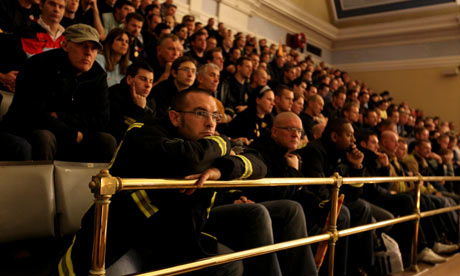
The Office for Budget Responsibility (OBR) said details of the government's four-year spending review, published last month, had enabled it to slash its estimate of public-sector job losses to 330,000 from 490,000. However, it believes that the government's policy to freeze public spending in 2015-16 could lead to further job losses of 80,000 that year unless welfare spending is cut further.
"We expect employment growth in the market sector will more than offset cuts in the public sector just as it did in the consolidation of the early 1990s," said the watchdog, which was set up by the chancellor, George Osborne, when he took office in May.
It delivered a further boost to the coalition government by saying that the probability of it achieving its deficit-cutting goals had increased since June.
The OBR cut its growth forecasts for coming years, although it remains markedly more optimistic than other forecasters, including the Organisation for Economic Co-operation and Development. As expected, the OBR upgraded its forecast for growth this year to 1.8% from 1.2% in June, reflecting the economy's surprisingly strong performance in the summer. This matches the OECD's latest prediction.
But for next year, the independent OBR cut its growth estimate to 2.1% from 2.3% – which is far more bullish than the OECD's prediction of 1.7%, and City economists' forecasts. When the OECD, the respected Paris-based thinktank funded by 30 countries, recently revised its estimates, it said the UK government's austerity measures would increase the "headwinds" facing the economy and "hamper growth".
The OBR, headed by Robert Chote, the former Institute for Fiscal Studies chief, is also significantly more optimistic about 2012 when it expects Britain's economy to grow by 2.6%, revised lower from 2.8% in June. This compares with the OECD's prediction of 2% growth.
Hetal Mehta, UK economist at Daiwa Capital Markets, said: "As expected, the recent run of upside surprises on GDP growth has led the OBR to revise up its forecast for 2010.
"The downward revision to 2011 growth is apparently thanks to consumers bringing forward their spending from the first quarter ahead of the VAT hike, although this was known at the time of the June forecast. In any case, it brings the OBR somewhat closer to the consensus, but we feel this is still on the optimistic side at over 2%. We expect growth of 1.6% in 2011," she said.
Douglas McWilliams, chief executive of the Centre for Economics and Business Research, echoed those comments. "We think the OBR is particularly over-optimistic on the consumer-side of the economy ... The key problem – one that seems to be pervasive in Whitehall to judge by these forecasts – is that people in government have no idea what is going on in the real world of business.
"They seem to think that a degree of economic momentum will continue regardless of the circumstances."
The OBR left its estimate for net borrowing this financial year virtually unchanged at £148.5bn (compared with £149bn in June). However, it said the coalition government now had a greater than 50% chance of achieving its deficit goals.
"The government has a slightly wider margin for error in meeting the mandate than appeared likely in June," it said.
It now sees borrowing as a percentage of gross domestic product at 10% this fiscal year, falling to 1.9% by 2014-15. Previously, it had seen the deficit at 10.1% of national output this year, dropping to 2.1% in the next four years.
The body was sanguine about the British contribution to the Irish bailout. "The only element that would score in the public finances would be the £3.2bn bilateral loan," it said. However, this would not affect Britain's borrowing position. "Any profit (on the interest) would reduce public-sector net borrowing. As the timing, duration and interest rate on the loan have not been announced, we could not score it in the current forecasts, but clearly the sums involved are too small to have any material effect on the outlook."
source
George Osborne sees the road to recovery despite report
New fiscal watchdog warns economic situation is delicately balanced, while Labour says government predictions are overly optimistic
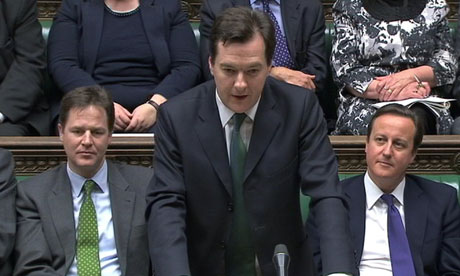
The chancellor, who was accused of not having a plan B, told the Commons he would "stick to the course" following a report by the Office for Budget Responsibility (OBR) that provided both ministers and opposition MPs with ammunition as they debated the fate of the economy.
Osborne said the OBR's independent forecast backed his view that the UK was likely to avoid a double-dip recession next year and grow steadily over the life of the parliament. It said the economy would grow by 1.8% this year – a substantial increase on the 1.2% previously expected, and greater than forecasts by international groups such as the OECD.
Osborne told MPs: "This is an uncertain world but the British recovery is on track.
Employment is growing, one million more jobs are being created, the deficit is set to fall, the plan is working. So we will stick to the course. That is the only way to help confidence to flourish and growth to return."
The OBR report, made in response to the government's comprehensive spending review, also backed projections by the Treasury that the UK's annual budget deficit would be reduced from one of the highest in the G20 to one of the lowest following five years of austerity.
Osborne said the UK would avoid the fate of Ireland, which has agreed to accept an £85bn bailout, with £7bn from the UK.
The OBR also revised downwards its forecast for the number of job losses in the public sector, from 490,000 to 330,000, after a switch from cuts in Whitehall spending to cuts in welfare payments over the next five years.
But the OBR said growth over the next two years would be less than expected, giving support to opposition claims that austerity measures would hurt the recovery. Critics of the tax and spending plans said the coalition was gambling that exports would rise and businesses would dramatically increase employment to drive Britain out of recession.
Several business groups and City analysts joined the shadow chancellor, Alan Johnson, in calling the OBR's forecasts "overly optimistic" when the world economy was slowing and continental Europe was in the grip of a debt crisis.
Johnson characterised Osborne's approach as a "reckless gamble" that relied too heavily on exports and could lead to a "jobless recovery". He said the chancellor was attempting fiscal tightening at a rate that had only been attempted twice in living memory – both times by countries benefiting from strong growth.
Douglas Alexander, the shadow work and pensions secretary, will warn in a speech today that "In the current economic crisis, no country other than Ireland has attempted to cut so deeply, so quickly," he told MPs. "The chancellor has chosen to take an unprecedented gamble with people's livelihoods and the country's future, and he has done so on the basis of a fundamental deceit that when he assumed office the public finances were worse than expected. …
" The reckless gamble that members opposite support is still to come. The chancellor is in the casino, but he hasn't spun the wheel yet."
Osborne's austerity drive will make the return to pre-recession levels of employment "slower and more painful" than many people expect. With the dole queue shrinking by just 15,000 since the coalition came to power, it could take 15 years before numbers claiming out-of-work benefits drop below one million if present trends continue, he will say.
Most economists have spent the last three months downgrading forecasts for next year after surveys showed a slump in confidence among consumers and businesses. With house prices falling and much of the rise in employment attributed to part-time workers, consumer spending is expected to weaken.
The OBR forecast growth would moderate next year from 2.3% to 2.1%, as exports and business investment slowed.
According to analysts at Cambridge Econometrics, even this forecast was optimistic, while David Kern, chief economist at the British Chambers of Commerce, warned the economy would struggle next year and unemployment was likely rise above the 8% predicted by the OBR.
The TUC general secretary, Brendan Barber, said Osborne "must have missed the forecast showing unemployment little better than static for the next three years". He added: "What is the point of economic policy if it does not include getting people back to work? And while the OBR report is full of uncertainty [about the economy] … George Osborne does not have the plan B any sensible chancellor should."
Osborne, who used his response to the OBR report to announce a review of corporation tax, said borrowing this year was expected to be £1bn less than forecast in June. He added: "On the OBR's central forecast, we will meet our fiscal mandate to eliminate the structural current budget deficit one year early, in 2014-15. And the same is true for our target to get debt falling as a percentage of GDP." Over the forecast period, Osborne said £19bn would be saved in interest payments on the national debt.
source
Philip Green to be target of corporate tax avoidance protest
• UK Uncut challenge billionaire Cameron efficiency adviser
• 'Tax avoidance' protest focuses on Green's Arcadia's stores
• 'Tax avoidance' protest focuses on Green's Arcadia's stores
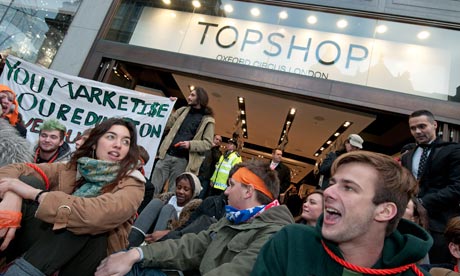
High street stores belonging to the businessman's group, including Topshop, Dorothy Perkins and Miss Selfridge, will be among those that protesters focus on in the run-up to Christmas.
Plans to disrupt Arcadia Group stores were devised by UK Uncut, a fast-expanding group of activists who have closed down more than 30 Vodafone shops in the past six weeks by mobilising through social networks.
UK Uncut's Twitter hashtag, #ukuncut, has become the rallying point for opponents of the government's austerity cuts. It was used widely by protesters who this month clashed with police during two large demonstrations against the proposed increase in student tuition fees.
The group started up when activists decided to target Vodafone on 27 October, claiming that the company had avoided £6bn in tax, an allegation denied by Vodafone. The protest, organised through Twitter, went viral and over some weeks more stores closed.
About 20 UK Uncut activists met several times before deciding to make Green a target. They plan to call on activists to approach shops in the Arcadia Group, as well as Vodafone, from Saturday. They intend to start by congregating at Green's flagship store, Topshop, in London's Oxford Circus. In a sign of UK Uncut's expanding popularity, they have secured the backing of the Jubilee Debt Campaign, and of War on Want, two mainstream anti-poverty campaigns with almost 30,000 supporters between them.
Activists hope a campaign against Green's retail empire will drive a wedge between David Cameron, who selected him to review efficiency in Whitehall, and the prime minister's Lib Dem partners, who are calling for action against tax avoiders.
Green's document, published in October, reported "shocking" wastage in the government's procurement strategy. However, his suitability as a government adviser was questioned because of his alleged tax avoidance. The businessman banked the biggest pay cheque in corporate history in 2005 when his Arcadia fashion business, which owns Topshop, paid a £1.2bn dividend. The record-breaking payment went to his wife, Tina, who lives in Monaco and is the direct owner of Arcadia. Because of this arrangement no UK income tax was due on the gain.
Richard Murphy, director of Tax Research UK, estimated Green saved £285m by paying the dividend to his wife.
Arcadia's holding company is Taveta Investments, which paid £71m in tax in the last financial year. Beyond Taveta, based behind Oxford Street, London, the ownership trail goes offshore via a Jersey-based investment vehicle called Taveta Ltd.
Arcadia has declined to comment about the planned protests or alleged tax avoidance. Green previously said the tax issue was not "relevant" to a discussion about his suitability to lead a government spending review. "I contribute tens of millions of pounds [to the exchequer]. I employ 45,000 people and pay tens and tens of millions of pounds of tax," he said.
Tax avoidance has been estimated by the TUC to have lost exchequer about £25bn in revenue, including £13bn attributed to individuals.
"Philip Green is a tax avoider, and yet is regarded by David Cameron as an appropriate man to advise the government on austerity," said UK Uncut's spokesman, 26-year-old Daniel Garvin. "His missing millions need to be reclaimed and invested into public services not into his wife's bank account."
source
Injuries and arrests as anti-cuts protest in south-east London turns violent
Police forced to call for reinforcements as hundreds force their way into Lewisham Council meeting
Police tonight arrested several people outside Lewisham town hall in south-east London as demonstrators tried to gatecrash a meeting where councillors were voting to cut the council budget by £60m.
Officers had to call for help from the Metropolitan police's Territorial Support Group as 100 protesters tried to force their way into the building.
"Police have made a number of arrests for criminal damage and public order offences," the Met said in a statement. "A number of police officers were treated for minor injuries."
Sue Luxton, a former Green party councillor who was returning home from work at 6.45pm, said she saw 200 to 300 protesters, including a large number of students from Goldsmiths College.
"People were angry because the council had arranged for only 40 people to attend the meeting, although many wanted to be there," Luxton said. "About 100 people tried to rush in. I think the police were little overwhelmed. There were police with riot shields and police horses. The area was cordoned off – buses couldn't get through."
A YouTube video showed much pushing and shoving outside the town hall as police barred protesters holding "fight the cuts" placards and who were chanting: "Let us in."
Darren Johnson, a Green councillor, said he voted against the cuts along with two Conservatives. The Labour majority voted in favour while the Liberal Democrats abstained.
"There are better ways of doing these rather deep cuts in frontline services," Johnson said. "I spoke of the importance of reducing high salaries of officers and cutting budgets for consultants, PR and marketing. These cuts will mean the closure of an early learning centre and less street cleaning."
Local councils face large budget cuts after the coalition government significantly reduced local government funding in October's comprehensive spending review. Lewisham has to find savings of £60m in its annual £271m budget over the next three years. Mike Harris, the Labour vice-chair of the council, said: "Lewisham gets 82% of its income from central government. After the CSR, we expect our budget to be reduced by 29% which will have an absolutely devastating effect on local services. Tonight, protesters set off flames and attempted to storm the town hall. The sad thing is, people will get increasingly angry as the cuts begin to bite on the very poorest in society."
source
Officers had to call for help from the Metropolitan police's Territorial Support Group as 100 protesters tried to force their way into the building.
"Police have made a number of arrests for criminal damage and public order offences," the Met said in a statement. "A number of police officers were treated for minor injuries."
Sue Luxton, a former Green party councillor who was returning home from work at 6.45pm, said she saw 200 to 300 protesters, including a large number of students from Goldsmiths College.
"People were angry because the council had arranged for only 40 people to attend the meeting, although many wanted to be there," Luxton said. "About 100 people tried to rush in. I think the police were little overwhelmed. There were police with riot shields and police horses. The area was cordoned off – buses couldn't get through."
A YouTube video showed much pushing and shoving outside the town hall as police barred protesters holding "fight the cuts" placards and who were chanting: "Let us in."
Darren Johnson, a Green councillor, said he voted against the cuts along with two Conservatives. The Labour majority voted in favour while the Liberal Democrats abstained.
"There are better ways of doing these rather deep cuts in frontline services," Johnson said. "I spoke of the importance of reducing high salaries of officers and cutting budgets for consultants, PR and marketing. These cuts will mean the closure of an early learning centre and less street cleaning."
Local councils face large budget cuts after the coalition government significantly reduced local government funding in October's comprehensive spending review. Lewisham has to find savings of £60m in its annual £271m budget over the next three years. Mike Harris, the Labour vice-chair of the council, said: "Lewisham gets 82% of its income from central government. After the CSR, we expect our budget to be reduced by 29% which will have an absolutely devastating effect on local services. Tonight, protesters set off flames and attempted to storm the town hall. The sad thing is, people will get increasingly angry as the cuts begin to bite on the very poorest in society."
source
Subscribe to:
Comments (Atom)


